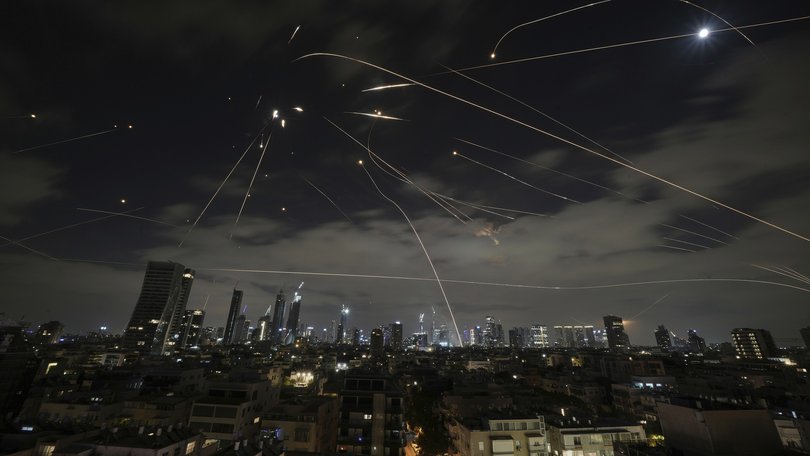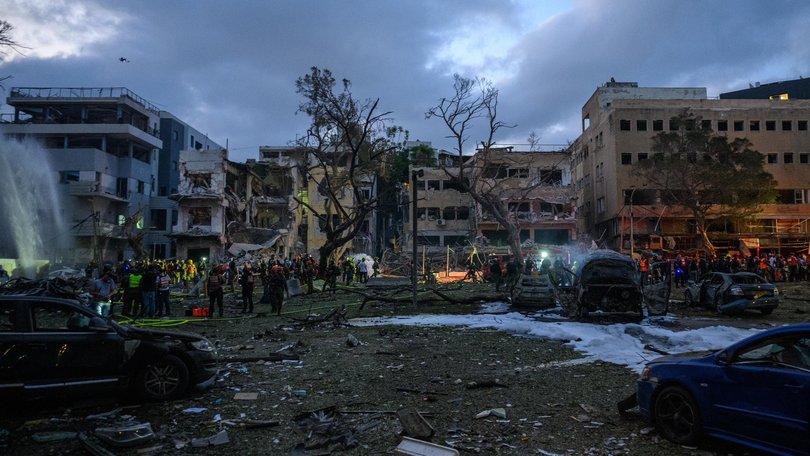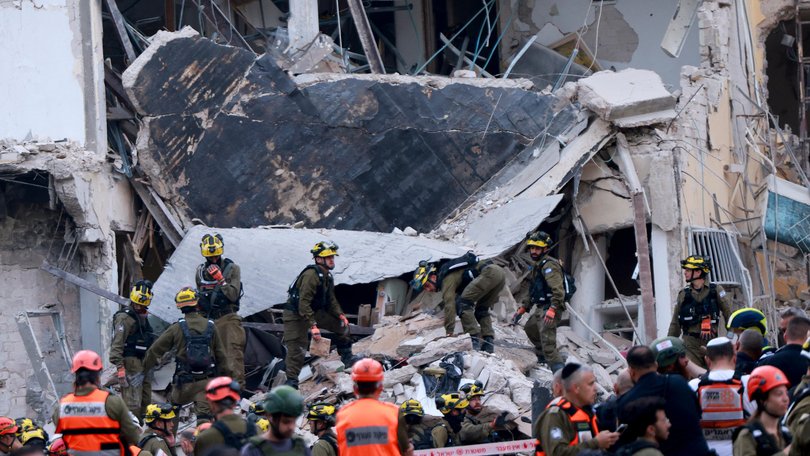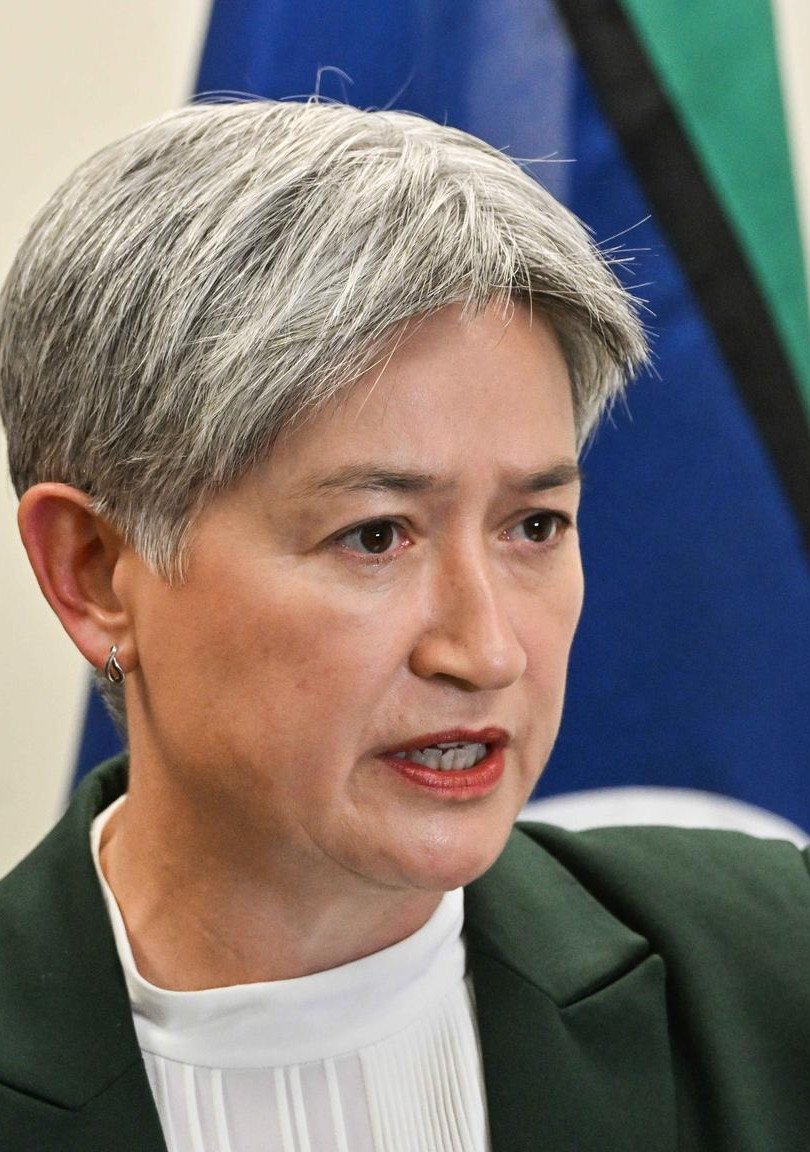Albanese urges restraint, Australians attempt to flee ‘perilous’ situation as Middle East conflict escalates
The Albanese Government on Monday urged restraint and a return to diplomacy in the Middle East amid fears the missile exchange between Israel and Iran could escalate into a broader regional conflict.

The Albanese Government on Monday urged restraint and a return to diplomacy in the Middle East amid fears the missile exchange between Israel and Iran could escalate into a broader regional conflict.
Fighting entered a fourth day with no signs of a let up as Iran launched a fresh wave of missiles overnight that reportedly killed up to eight people in Tel Aviv and Haifa.
The Israeli Defence Force responded that it had “precisely struck command centres” of the Quds Forced of the Islamic Revolutionary Guards Corps in the Iranian capital, Tehran.
Sign up to The Nightly's newsletters.
Get the first look at the digital newspaper, curated daily stories and breaking headlines delivered to your inbox.
By continuing you agree to our Terms and Privacy Policy.Israeli strikes on Iran on Sunday killed the intelligence chief of the country’s Revolutionary Guards, Mohammad Kazemi, Iran’s IRNA state media news agency reported.
Both sides also stepped up their war rhetoric.
Iranian President Masoud Pezeshkian urged citizens to unite against “this genocidal criminal aggression with unity and coherence,” in an address to parliament.
Meanwhile, Israeli defence minister Israel Katz warned that, “the residents of Tehran will pay the price — and soon,” for the overnight attack.
Prime Minister Anthony Albanese addressed the deepening crisis with Canadian leader Mark Carney as he arrived in Kananaskis, Alberta for the G7 summit on Monday morning AEST.
“Both of us, I think, share a view wanting to see a de-escalation of conflict, wanting to prioritise dialogue and diplomacy,” he said.
Asked how he would react if there was a G7 move to support Israel’s fight against Iran, Mr Albanese said Australia wasn’t a member of the G7 and it was a matter for those leaders.
Mr Albanese added that he would be focussing on Australia-US relations during his first one-on-one meeting with US President Donald Trump on the margins of the summit, expected on Wednesday morning AEST.
But the war in the Middle East is expected to loom large over the three-day Group of Seven forum, attended by G7 leaders from the US, France, UK, Germany, Japan, Italy and Canada, as well as from non-G7 leaders from Mexico, India and Ukraine.
Speaking on Marine One as he departed for the Calgary meeting, US President Donald Trump said he hoped there would be a deal and thought it was “time for a deal”.
However, he added: “Sometimes they have to fight it out. We’ll see what happens.”

The US President refused to say whether he had called on Israel to pause strikes into Iran.
The US could become involved in the conflict, he separately told US broadcaster ABC News. “It’s possible we could get involved. But we are not at this moment involved,” Mr Trump said.
US media outlets on Monday reported that Mr Trump had rejected a plan presented by Israel to kill Iran’s Supreme Leader Ayatollah Ali Khamenei.
The White House made clear to Israeli officials that Mr Trump was opposed to the Israelis making the move to avoid enflaming the conflict and potentially destabilising the region, said the AP.
During an interview with Fox News, Israeli Prime Minister Benjamin Netanyahu did not directly confirm or deny the report that such a plan had been vetoed.
“But I can tell you … we’ll do what we need to do,” he added.
Mr Netanyahu’s spokesperson Omer Dostri later called reports about the plan “fake”.
Earlier on Monday morning, Deputy Prime Minister Richard Marles also warned of the “potential for escalation” in the Middle East as casualties mounted.

At least 20 people had been killed and more than 300 had been injured in Israel at the time of publication, according to reports from the Magen David Adom rescue service and Israeli Army Radio.
In Iran, where limited foreign media access and strict censorship makes information hard to verify, local media, citing the health ministry, reported that 224 Iranians had been killed and 1,277 injured.
“Obviously, the way in which this has unfolded over the last few days has been a matter of deep concern, and we are worried about this going to a place of being a broader conflict,” Mr Marles told ABC Radio National Breakfast.
“That is why we are exercising our voice, along with countries like the United States, like France, Germany, the UK, to urge for diplomacy and dialogue in this moment.”
He later told the Defending Australia conference in Canberra that we “completely understand the threat that is represented by Iran’s nuclear and ballistic missile program.
“That is not just a threat to the Middle East, that is a threat to the peace and stability of the world.”
Foreign Minister Penny Wong has spoken with both Iranian Foreign Minister Abbas Araghchi and her Israeli counterpart Gideon Sa’ar to appeal for de-escalation and restraint, warning of a “perilous” situation.

Shortly after she revealed her phone call with Mr Araghchi, Israeli ambassador to Australia, Amir Maimon, issued a statement cautioning that, “some still urge diplomacy, as if words can stop warheads”.
“History has shown what happens when the world ignores regimes that preach hatred, promise annihilation, and are left with the means to carry it out,” he said in a post on X.
Asked about the comments, Senator Wong said she spoke regularly to the ambassador and that “no one doubts the threat Iran proposes”.
Australia had joined the international pressure applied to the Iranian regime over its nuclear program and their non-profileration obligations, she added.
All Australian diplomats and defence personnel in both countries are reported to be safe and Australian citizens have been told to shelter in place due to closed airspace.
Iran and Israel are currently subject to a “do not travel” notice.
Visiting the Department of Foreign Affairs and Trade’s crisis centre on Monday, the Foreign Minister said officials were working on a “range of plans” to help Australians escape.
This includes “a plan for assisted departures when air space is open and when it is safe to do so,” she said, revealing 350 Australians in Iran and 300 people in Israel had registered for assistance.
“I understand, particularly those who are in the Middle East, in Israel or Iran, how worrying this situation is, how frightening it is. And I also recognise for families of people who are in the region, this is a distressing time,” she said.
The rapidly deteriorating situation and has triggered alarm among Australia’s Iranian and Jewish communities, many of whom have relatives in the region.
Rana Dadpour, the founder of advocacy group AUSIRAN, said the community was conflicted between a sense of justice at high-ranking commanders being eliminated and the fact that the population was facing the terror of war because of the regime’s nuclear program.
“People are scared for their lives. We are scared for the loss of our loved ones,” she said, adding that there were no bomb shelters or emergency alerts to warn of incoming missiles.
Some were trying to flee Tehran, but were hampered by heavy traffic and shortage of fuel, she said. Meanwhile, the regime was arresting people for posting about the situation on social media.
“I’m hoping, whatever happens at the end of the day, for the Iranian people to be able to live a free life, and for this regime to be gone,” she said.
Colin Rubenstein, executive director of the Australia Israel and Jewish Affairs Council also referred to a mixture of anxiety and hope.
“We’re very disappointed with the fact that some of those missiles are getting through, but there’s overwhelming consensus that Israel had to take the opportunity at this time to act,” he said.
“There’s no doubt that the Australian Jewish community understands this regime is truly a messianic extremist group arming itself, on the cusp of developing a nuclear weapon and, as we’ve seen, this has escalated in recent times.”
Most Iranians were fed up with the barbaric regime, he said. “There is a degree of hope in a majority of the Iranian population that they be liberated from these radical theocratic monsters who rule them.”

